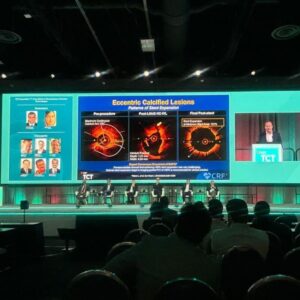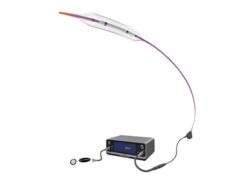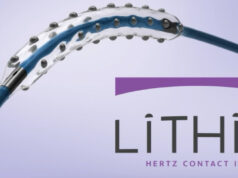
Six-month data from the PINNACLE I study evaluating the safety and performance of the LithiX Hertz Contact (HC, Elixir Medical) intravascular lithotripsy system (IVL) for the treatment of moderate to severely calcified coronary artery lesions have been reported at TCT 2024 (27–30 October, Washington, DC, USA).
“The cardiology community has long sought solutions that can better treat patients with calcified lesions to achieve optimal percutaneous coronary intervention (PCI) outcomes,” said Johan Bennett (University Hospital Leuven, Leuven, Belgium) PINNACLE I principal investigator. “The six-month PINNACLE I data are a strong validation of LithiX IVL’s mechanism of action that can safely fragment calcium across a range of complex morphologies without trauma to the soft tissue and can be easily integrated into standard PCI procedure workflow without the need for an energy source.”
LithiX data results demonstrate 98.3% clinical success (primary effectiveness and safety endpoint) with 100% angiographic success across a range of moderate to severe calcium morphologies, alongside < 30% residual diameter stenosis was achieved in 100% of the lesions. Bennett reported no procedural angiographic complications, including no severe dissections, perforation, or abrupt closure post-stenting.
The system also registered positive safety and efficacy with only one peri-procedural non-Q-wave myocardial infarction resulting in a 1.7% TLF event rate through six months.
An intravascular imaging sub-study using optical coherence tomography (OCT) was conducted to accurately assess lesion complexity and calcium fragmentation effectiveness of LithiX IVL across a range of complex calcium morphologies.
OCT sub-study results demonstrate LithiX IVL treatment effect across a broad range of lesions, including in eccentric lesions with 184.38 (± 56.42) degrees of maximum continuous calcium arc with calcium nodules present in 33.3% of lesions.
Additionally, 84.6% of eccentric lesions had documented fractures and 61.5% of lesions with two or more fractures with 0.76 mm (±0.28 mm) average fracture depth and 0.51 mm (±0.23 mm) average fracture width, 97.86% stent expansion at Maximum Calcium Site (MCS) and 101.38% stent expansion at Minimum Stent Area (MSA) site.
In concentric lesions with 317.47 (± 22.51) degrees of maximum continuous calcium arc with calcium nodules present in 29.4% of lesions 94.7% of lesions had documented fractures and 84.2% of lesions with two or more fractures with 0.85 mm (±0.36 mm) average fracture depth and 0.75 mm (± 0.29 mm) average fracture width, 106.58% stent expansion at MCS and 93.95% stent expansion at MSA site.
“We developed LithiX to improve the IVL treatment of calcified lesions with shorter procedure times and effectiveness across a broad range of calcified lesions, and we’re delighted with the PINNACLE I study outcomes demonstrating its sustained safety and effectiveness,” said Motasim Sirhan, CEO of Elixir Medical. “Our team is committed to developing transformative cardiovascular technologies that deliver improved physician experiences and most importantly, better clinical outcomes for patients.”
The novel LithiX Hertz Contact IVL system is the first non-energy based IVL technology designed to fragment moderate to severe calcified lesions resistant to optimal stent expansion.
The LithiX IVL mechanism of action is based on the physics principle of Hertz Contact Stress propagating the required discrete forces to fragment calcium without causing vessel injury, without the need for energy source or capital equipment.











